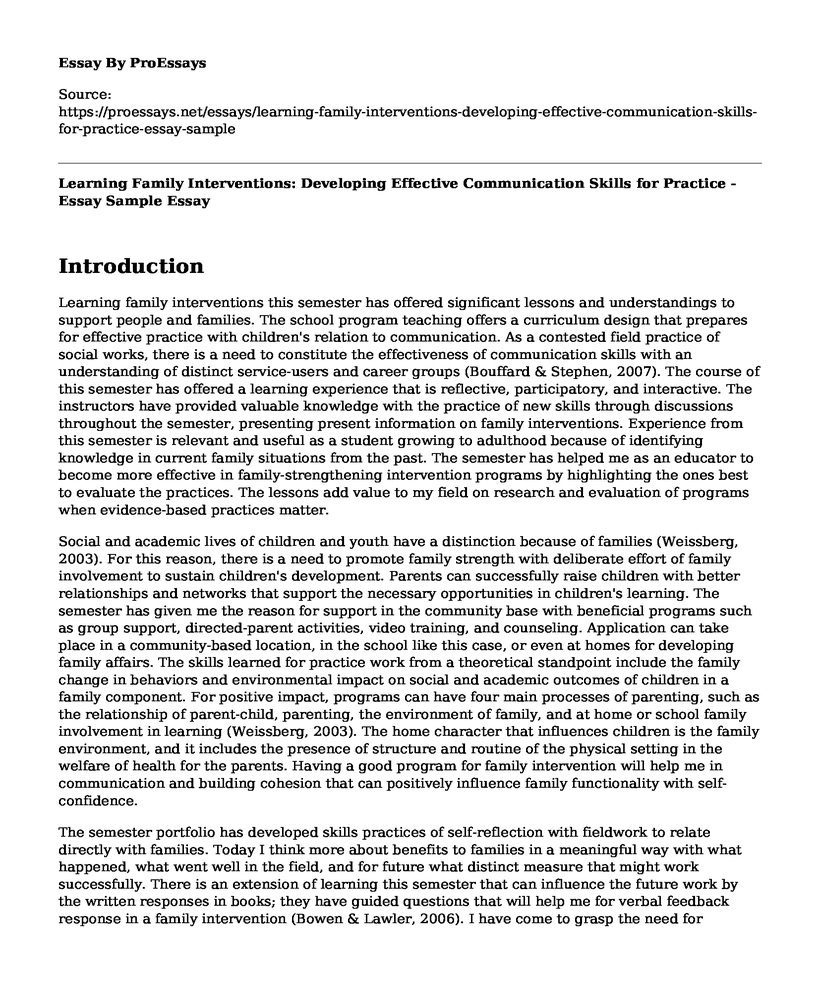Introduction
Learning family interventions this semester has offered significant lessons and understandings to support people and families. The school program teaching offers a curriculum design that prepares for effective practice with children's relation to communication. As a contested field practice of social works, there is a need to constitute the effectiveness of communication skills with an understanding of distinct service-users and career groups (Bouffard & Stephen, 2007). The course of this semester has offered a learning experience that is reflective, participatory, and interactive. The instructors have provided valuable knowledge with the practice of new skills through discussions throughout the semester, presenting present information on family interventions. Experience from this semester is relevant and useful as a student growing to adulthood because of identifying knowledge in current family situations from the past. The semester has helped me as an educator to become more effective in family-strengthening intervention programs by highlighting the ones best to evaluate the practices. The lessons add value to my field on research and evaluation of programs when evidence-based practices matter.
Social and academic lives of children and youth have a distinction because of families (Weissberg, 2003). For this reason, there is a need to promote family strength with deliberate effort of family involvement to sustain children's development. Parents can successfully raise children with better relationships and networks that support the necessary opportunities in children's learning. The semester has given me the reason for support in the community base with beneficial programs such as group support, directed-parent activities, video training, and counseling. Application can take place in a community-based location, in the school like this case, or even at homes for developing family affairs. The skills learned for practice work from a theoretical standpoint include the family change in behaviors and environmental impact on social and academic outcomes of children in a family component. For positive impact, programs can have four main processes of parenting, such as the relationship of parent-child, parenting, the environment of family, and at home or school family involvement in learning (Weissberg, 2003). The home character that influences children is the family environment, and it includes the presence of structure and routine of the physical setting in the welfare of health for the parents. Having a good program for family intervention will help me in communication and building cohesion that can positively influence family functionality with self-confidence.
The semester portfolio has developed skills practices of self-reflection with fieldwork to relate directly with families. Today I think more about benefits to families in a meaningful way with what happened, what went well in the field, and for future what distinct measure that might work successfully. There is an extension of learning this semester that can influence the future work by the written responses in books; they have guided questions that will help me for verbal feedback response in a family intervention (Bowen & Lawler, 2006). I have come to grasp the need for enactment for family intervention, whereby it is a dysfunctional relationship pattern. For future work, this will help in therapy during a family session by entering the family unit and acting out some of their behaviors. As a therapist, I will be able to create interactional patterns by learning about the family structure with an interference process point out harmful elements and modify them, thus intensifying positives. The issues that occur within a family unit stem problems that individual's evidence and this can cause division. In a family intervention address, there is a requirement to be a part of the family unit and intervene to enable seeing from inside the family patterns and problems for individuals. I will be able to practice therapy by understanding the faults of fission and help in success.
Family interventions express functioning that relates to communication that is a verbal and nonverbal connection with emotional transmission for problem roles and solving them in a household. There is an understanding in performing assessment that I do not assign to own beliefs of a family because they are part of emotional functioning. Definition of a family is who they say they are; therefore, distancing from their ideas can address past emotional attachments, present, and future. There is a lot of appreciation for community-based organizations and schools in calling upon family interventions to strengthen and support their abilities to guide the learning of their children.
References
Bouffard, S. M., & Stephen, N. (2007). Promoting family involvement. Principal’s Research Review, 2(6), 1-8.
Bowen, D. E., & Lawler III, E. E. (2006). The empowerment of service workers: What, why, how, and when. Managing innovation and change, 33, 155-69. Retrieved May 13, 2020, from https://sloanreview.mit.edu/article/the-empowerment-of-service-workers-what-why-how-and-when/
Weissberg, R. P. (2003). Prevention that works for children and youth: An introduction (Vol. 58, No. 6-7, p. 425). American Psychological Association.
Cite this page
Learning Family Interventions: Developing Effective Communication Skills for Practice - Essay Sample. (2023, Aug 01). Retrieved from https://proessays.net/essays/learning-family-interventions-developing-effective-communication-skills-for-practice-essay-sample
If you are the original author of this essay and no longer wish to have it published on the ProEssays website, please click below to request its removal:
- Understanding of Children Regarding Gender-related Responsibilities of Parents
- Essay on Family Stress
- Shaw Shank Redemption Ethical Dilemmas - Film Analysis Essay
- Classical Music Concert Report
- Balancing Work and Family: The Military Corps Experience - Essay Sample
- Essay on 1960s Civil Rights Movement Inspires Lee's 'To Kill a Mockingbird'.
- Communication Skills - Free Essay Sample







